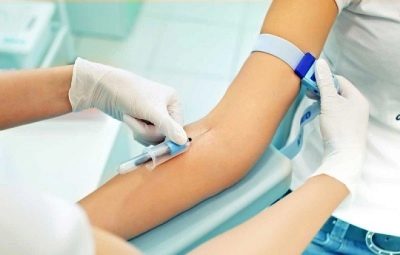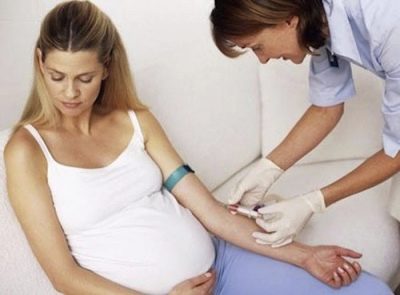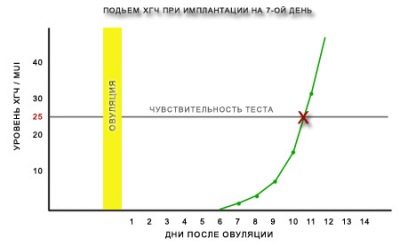How long does a blood test for hCG show pregnancy?
Sometimes a woman has an urgent need to find out if she is pregnant as soon as possible. Some rush to the nearest pharmacy to buy test strips in the hope of seeing the result on them even before the next menstruation delay occurs, but there is a more accurate and informative way to find out if there is a pregnancy at the earliest time - to donate blood for hCG.
What it is?
HCG or hCG is a hormone that begins to be produced in the body by the cells of an embryological structure like the chorion. This happens after the fertilized egg is implanted.
The first 6-8 days after conception, it moves into the uterine cavity through the tube, and these days human chorionic gonadotropin (this is the full name of the substance) is not produced.
As soon as the egg is implanted, chorionic tissues begin to produce doses of HCG. The hormone is needed so that all the conditions for the development of an attached embryo are created in the female body. The hormone suppresses the processes normal for changing the phases of the menstrual cycle, because there is no need for them for the next nine months. In addition, under the influence of this protein hormone, the corpus luteum begins to produce huge amounts of progesterone, androgens and estrogen. These substances help to preserve and successfully transfer the pregnancy.. Chorionic gonadotropic hormone causes changes in the functioning of the adrenal cortex, which leads to the necessary in this case physiological immunosuppression.
If a woman’s immunity is not oppressed, then he can reject the embryo, which is 50% foreign to the genetic set. It is hCG that provides some reduction in immune responses aimed at preserving the child. Later, when the placenta is formed, this hormone contributes to its development, improves the vascular permeability of the placenta. In women outside of pregnancy and men, such a hormone can appear in the blood during certain tumor processes in the body, and these neoplasms are likely to be malignant.
On the features of a pregnant female body to produce this hormone, which is also called "pregnancy hormone", by the way, pregnancy test strips, so beloved by women and girls, are based, which can be bought at any pharmacy and in any store. True, it should be understood that the test is designed to determine hormone in the urine, and in it it appears in the required amount much later than in the blood. Therefore, a blood test may give a reliable result sooner than a pharmacy pregnancy test.
Why do we need such an analysis?
In addition to the satisfaction of simple female curiosity - is there a pregnancy or not, the level of hCG can tell a lot. A blood test for hormone concentration is prescribed to find out if pregnancy is multiple (Each embryo produces a certain amount of hormonal "accompaniment", and the level of the substance in the future mother's blood depends on the number of embryos. Blood for hCG is given during prenatal screening periods - at 11-13 weeks and at 16-19 weeks of pregnancy, to find out how big a child has risks of being born with severe gross chromosomal malformations.)
Such an analysis is sent to a woman with suspected missed abortion, delayed fetal development, and an ectopic pregnancy, since the concentration of the substance in the blood can indicate both the progressive development of the baby and its death. The analysis is considered mandatory for women who underwent an abortion (both medical and normal). The rapidly decreasing level of this hormone-gonadotrope will be able to inform the attending physician about how successful the curettage has been. All non-pregnant women and men with suspected malignant tumors, especially testicular tumors in the stronger sex, donate blood for HCG.
When can I take it?
The level of human chorionic gonadotropin in the body of a woman who will soon become a mother doubles every two days. If we consider that about a week the future baby needs to get to the place of attachment.
The first laboratory data on the increase in hCG in the blood can be obtained approximately 10 days after fertilization.
This is 4-5 days earlier than the pharmacy tests can show the second striped. The sensitivity of such tests to the hormone is 2 times lower, and the concentration of the hormone in the urine increases twice as slowly as in the blood. Thus, if we take as a basis the fact that the level of hCG in a non-pregnant woman does not exceed 5 mU / ml, it is clear that on the second day after implantation (9-10 days after fertilization) the hormone level will increase to 10 mU / ml, and after 2 days - up to 20 mU / ml. By the 14th day after conception, the level will be about 40-60 mU / ml. In the urine of human chorionic gonadotropin, about 30 mU / ml will be detected, which exceeds the sensitivity threshold of the pharmacy test strip (15–20 mU / ml, depending on the manufacturer), and a woman will be able to see two strips.
However, tests may give incorrect results, may be defective or conducted with errors. With a blood test, everything is much more accurate.
It not only determines the fact of an accomplished pregnancy, but also indicates the period, the well-being of the development of the embryo, as well as the possibility of developing not one baby, but several at once.
It is impossible to determine a pregnancy by a general blood test; a biochemical examination of the venous blood of a woman is required. And you should take it no earlier than 10-12 days after ovulation. The possibility of late implantation should also be taken into account, when the fertilized egg descends into the uterine cavity and is fixed there not 7-8 days after conception, but only 10 days later. Then the blood test will show pregnancy only 14 days after ovulation.
Theoretical and practical ability to find out whether the conception took place even before the delay of menstruation, is only with the help of laboratory diagnostics of blood for the content of hCG in it.
How to pass?
The reliability of the result of the analysis can be affected by much - colds and infectious diseases that a woman has, especially her diet, severe stress. Therefore, before surrender It is recommended to prepare yourself for early diagnosis.. You need to make sure that there is no fever, signs of viral or other diseases.
If a woman wants to determine pregnancy before the delay of menstruation, then she should consider the possibility of repeated blood donation, since dynamic results will be important. Between primary and re-surrender, it is advisable to take a break of 2 days.
A day before visiting the laboratory, a woman should refrain from fatty and fried foods, an abundance of spices and sweets so that food does not affect the composition of the blood.
The last meal is desirable to carry out no later than 6-8 hours before the analysis, come to a medical facility should be on an empty stomach in the morning.
If a woman has taken any hormonal medications in the last 2 weeks, then this should be reported before taking the test.
The result can be expected in a few hours or a few days - it depends on the pace of work and the workload of the laboratory. If a woman turns to a private clinic and makes an analysis for a fee, then there is every chance of getting the result already that evening or even earlier.
How to understand the result?
None of the laboratory technicians will explain to the woman what the numbers mean as a result of her analysis, since the doctor should do this. However, it is not always the case that a woman is registered at the gynecologist on the same day, and I want to understand what the blood tests showed, right now. It is difficult to bring uniform norms of hCG concentration values, since each laboratory has its own figures. However, there are certain approximate standards that can speak not only about the fact of pregnancy, but also its possible duration.
0-5 IU / ml | No pregnancy |
25-156 honey / ml | Early pregnancy (no more than 1-2 weeks from conception) |
101 - 4870 mU / ml | Pregnancy is (2-3 weeks from conception) |
1110 - 31500 mU / ml | Pregnancy is (3-4 weeks from conception) |
2560 - 82300 mU / ml | Pregnancy is (4-5 weeks from conception) |
Since the hormonal support of the body is double in multiple pregnancies, the results of hCG in pregnancy with twins or triplets will significantly exceed the above values (in proportion to the number of children).
You should not do a reanalysis, if it is necessary, in another laboratory, since the comparison of two different analyzes is not permissible. It is necessary to repeat the examination in the same laboratory as the first time.
Possible mistakes
The accuracy of this analysis is high, which is why the examination method has found such wide application in medicine, especially in gynecology and obstetrics. However, no one is immune from mistakes, so you should consider the likely erroneous results.
False positive result - HCG is, and there is no pregnancy
Elevated levels of gonadotropin can be detected in women who have taken hormonal drugs, have been treated for infertility. It may also be elevated levels of hormone during tumor processes in the body. If the result is questionable, it is advisable to retake blood after 4-6 days. If the level of the hormone does not increase or grows up quite slightly, there is no pregnancy, you should look for the true cause of the change in the hormonal levels.
Often a woman can get a negative result at home with the help of a test strip, but the HCG in the blood will be high, and this suggests that there is a pregnancy, simply its duration is so small that the hormone is not detected in urine.
False negative result - no hCG, but there is a pregnancy
A negative result from the laboratory can get a pregnant woman. This becomes possible if it was too early to be examined - implantation has not yet taken place, the hormone is not produced. Too early - the concept is quite specific - up to 10-12 days after ovulation, and preferably up to 14 days after it, there is nothing to do in the laboratory. Negative or slightly positive may be the result, in which the level of hCG is significantly lower than the level that should be at this time. In this case, doctors may suspect an ectopic pregnancy, non-developing pregnancy. A careful examination of the blood over the dynamics (every 2 days) is required, and a little later an ultrasound diagnosis is needed to establish the site of attachment of the ovum and its viability.
Common Questions
The topic of human chorionic gonadotropin is given a lot of pages of women's forums on the Internet. Perhaps no other hormone of the human body does not cause such a lively interest.Here are the short answers to the most common questions from girls and women about HCG.
How long does HCG show?
Numerical values, as already mentioned, are different in each laboratory, and the correspondence tables are also different. However, it should be understood that all tables, without exception, are based on compliance with the embryonic period, and not obstetric. Obstetric is measured from the first day of the last menstruation. Fetal - from the day of conception. Thus, if a blood test for the content of chorionic gonadotropin showed that a woman has 2-3 weeks of pregnancy, this means that by obstetric standards she has 4-5 weeks, and from a day of delay from several days to 1 week have passed.
HCG increased
If in the earliest terms, hCG shows a significant excess of the norms for the period of gestation, then it is likely that the woman conceived twins. Also, elevated hormone levels are characteristic of women with diabetes.
HCG lowered
If a woman has every reason to believe that she knows the exact date of conception, and the level of hCG in the first analysis indicates that the actual embryonic period is less, then we can talk about ectopic attachment of the ovum, the threat of miscarriage at an early date.
Negative hCG after positive
The first blood test for pregnancy could show positive results, but after a week the results were negative. Unfortunately, this happens quite often. Fertilization took place, implantation took place in the uterine cavity, but for some internal reasons the fertilized egg stopped developing and the level of the corresponding chorionic hormone dropped.
If the woman would not donate blood for laboratory diagnostics at all, everything would look like menstruation, which came with a strong delay (for a couple of weeks), which passed a little more painfully than usual, with the appearance of blood clots. Many women in such situations do not even realize that they had a pregnancy.
Is this analysis required?
The obligatory blood test for hCG for all pregnant women is only twice for the entire period of childbearing - during the first and second screening, they take place in 11-13 weeks, and then in 16-19 weeks. At other times, a blood test for the concentration of chorionic gonadotropin is not mandatory. There are categories of women who are recommended to take this analysis over time.
These include those who become pregnant with IVF (in vitro fertilization), women who have previously had frozen pregnancies and miscarriages in the earliest terms, pregnant with twins or triplets.
If you choose how to independently diagnose early pregnancy in a pre-medical order, then the choice remains for the woman. Drugstore tests often give unreliable results, and they even begin to "strip" after a delay. But they are inexpensive and available at any time.
To pass a blood test, you need to find a clinic, make an appointment, prepare and donate blood. All this, of course, paid. The cost of analysis on average in Russia ranges from 550 to 700 rubles, but the accuracy of the study is higher, and there is an opportunity to learn about the "interesting situation" before the delay of menstruation.
How does a hormone grow in the blood after fertilization?
Women who are very much waiting for pregnancy, the entire second half of their monthly cycle is already routinely measured in DPO - the days after ovulation. They measure the basal temperature, draw graphs, almost a day after the alleged conception they begin to buy pharmacy tests, trying to examine at least some signs of the second strip on a completely negative strip.
In order not to be nervous, not to twitch your loved ones and not to escalate the situation, you should know that hCG increase to about 4mU / ml only on day 7 after ovulation. This value is not able to catch the test strips, and laboratory analysis on this period will give an unambiguous negative result. At 9 DPO (day after ovulation), the level of gonadotropin rises to 11 mU / ml.This is also not enough for a complete diagnosis of home test, but already 2 times the “non-pregnant” rate in the blood.
At 11 DPO, the hormone concentration averages from 28 to 45 mU / ml, which is already determined in the laboratory without problems. By the first day of delay (14 DPO), the hormone is in a fairly high concentration (105-170 mU / ml), and this level can be easily detected by test stripes in the urine, and laboratory test reagents in the blood.
Should I do a blood test after ovulation stimulation?
If the drug with the same name (“Chorionic gonadotropin”) is used to stimulate the rupture of the follicle, then after the injection and intercourse you should not rush to the clinic to donate blood. The body of a woman needs about 10 days to get rid of the "pricked" hormone, otherwise a false positive result of the analysis is provided - a hormone will be detected in the blood, but there may be no pregnancy.
You can learn more about the analysis of hCG from the following video.

































